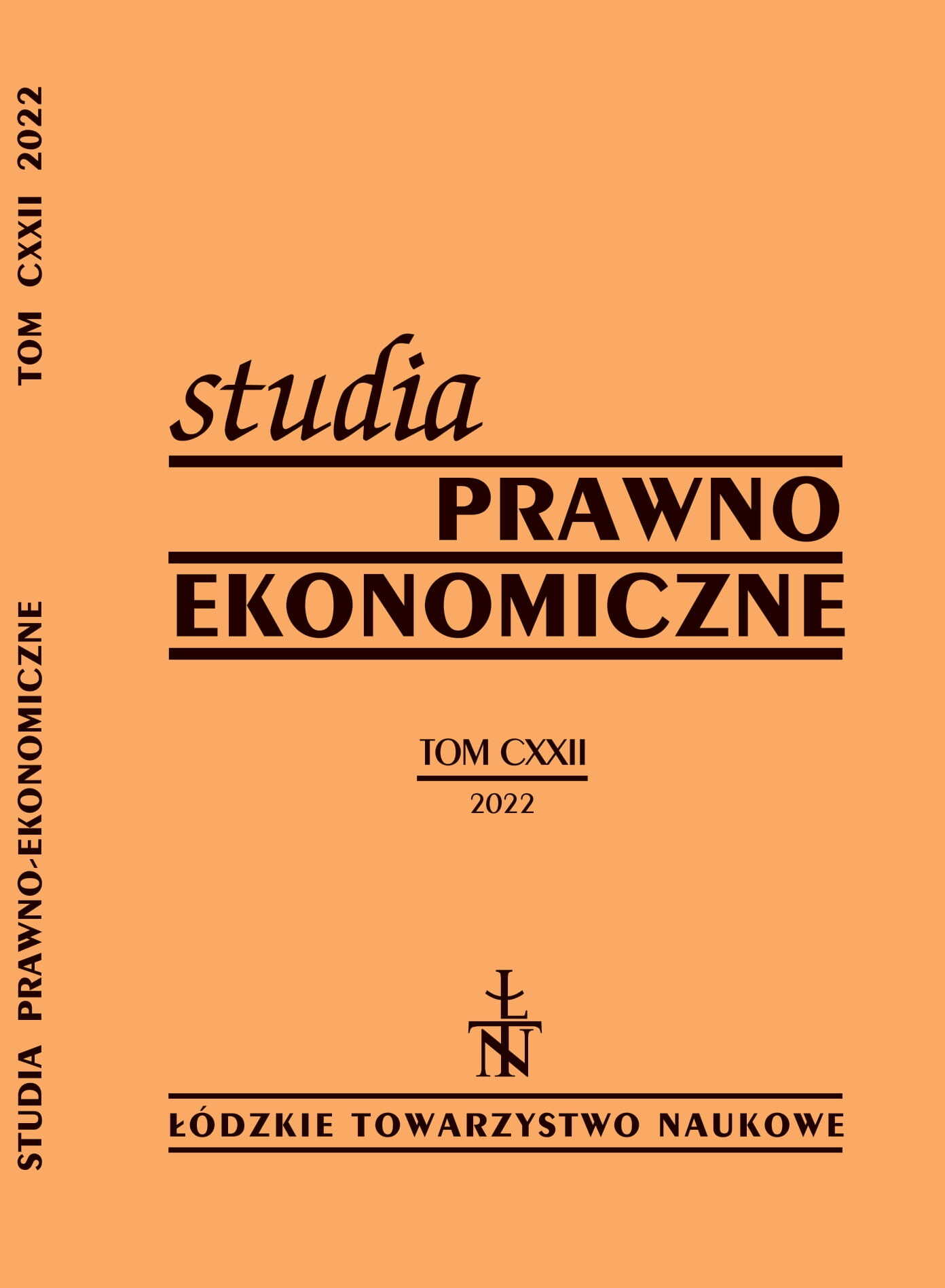Zakład zagraniczny w działalności cyfrowej
DOI:
https://doi.org/10.26485/SPE/2022/122/1Słowa kluczowe:
zakład zagraniczny, ekonomia cyfryzująca się, handel elektroniczny, obecność cyfrowa, istotna obecność w sensie ekonomicznymAbstrakt
Przedmiot badań: Obecne rozwiązania podatkowe w zakresie opodatkowania zakładu zagranicznego, oparte na fizycznej obecności przedsiębiorstwa na terytorium innego państwa, zostały opracowane z myślą o tradycyjnych przedsiębiorstwach, które nie prowadzą działalności w formie cyfrowej, w szczególności w Internecie. Biznes elektroniczny w dużej mierze opiera się na dobrach niematerialnych, takich jak algorytmy i dane użytkowników. Opodatkowanie biznesu cyfrowego stanowi problem globalny, którym zajmują się m.in. UE i OECD.
Cel badawczy: Artykuł ma na celu przedstawienie znaczenia i konsekwencji nowych propozycji UE i OECD, dotyczących opodatkowania dochodów wynikających z cyfryzacji gospodarki w świetle standardów przyjętych dla zakładu zagranicznego.
Metoda badawcza: Analiza źródeł prawa lub materiałów roboczych, w szczególności dyrektyw UE oraz raportów lub oświadczeń OECD publikowanych przed i po projekcie BEPS. Analiza porównawcza konsekwencji podatkowych na gruncie obecnych i planowanych przepisów dotyczących zakładu zagranicznego w działalności cyfrowej.
Wyniki: OECD w formule Ram Inkluzywnych (Inclusive Framework) odchodzi od problemu cyfryzacji na rzecz globalizacji i od opodatkowania największych gigantów technologicznych na rzecz opodatkowania największych i najbardziej dochodowych przedsiębiorstw. Koncepcja zakładu zagranicznego w ramach kompromisu z 2021 r. przybrała istotnie uproszczoną formę w porównaniu z tradycyjnym pojęciem zakładu, wymagającym analizy fizycznej obecności na terytorium danego państwa.
Liczba pobrań
Bibliografia
Adda M., Scandone F.S., Lorenzi U., The New Taxing Right under Pillar One: Preliminary Thoughts on Potential Implications for MNEs, International Transfer Pricing Journal 2021/1.
Altenburg N., Schlücke K., The New World of Pillar One – Practical Thoughts on the New Scope, International Transfer Pricing Journal 2022/1.
Anderson K., Should We Use Value Creation or Destination as a Basis for Taxing Digital Businesses? – Krister Andersson’s Comments on the 2018 Klaus Vogel Lecture Given by Professor Michael Devereux, Bulletin for International Taxation 2018/12.
Azam R., E-commerce Taxation and Cyberspace Law: Integrative Adaptation Model, Virginia Journal of Law & Technology Association 2007/12/5.
Basu S., Global perspectives on e-commerce taxation law, Burlington 2007.
Blum D., Permanent establishments and Action 1 on the digital economy of the OECD Base Erosion and Profit Shifting initiative – the nexus criterion redefined?, Bulletin for International Taxation 2015/ 6–7.
Brauner Y., Pistone P., Adapting current international taxation to new business models: two proposals for the European Union, Bulletin for International Taxation 2017/12.
CFE Fiscal Committee, Opinion Statement FC 1/2018 on the European Commission proposal of 21 March 2018 for a Council Directive on the common system of a digital services tax on revenues resulting from the provision of certain digital services, 2018, http://taxadviserseurope.org/blog/portfolio-items/opinion-statement-eu-commission-digitalservices-tax-proposal/; accessed 15.03.2022.
Chetcuti J.-P., The Challenge of E-commerce to the Definition of a Permanent Establishment: The OECD’s Respons, Inter Lawyer 2002.
Collin P., Colin N., Task Force on Taxation of the Digital Economy (Ministere de l’economie et des finances), 2013.
Cooper G.S., Building on the Rubble of Pillar One, Bulletin for International Taxation 2021/11–12.
Escribano E., Is the OECD/G20 BEPS Initiative Heading in the Right Direction? Some Forgotten (and Uncomfortable) Questions, Bulletin for International Taxation 2017/5.
Geurts M., Server as a permanent establishment?, Intertax 2000/28/4.
Hellerstein W., Jurisdiction to tax in the digital economy: permanent and Other establishments, Bulletin for International Taxation 2014/6–7.
Hongler P., Pistone P., Blueprints for a New PE Nexus to Tax Business Income in the Era of the Digital Economy, WU International Taxation Research Paper Series 2015/15.
Jamroży M., Janiszewska M., Permanent establishment as a foreign direct investment in Poland: identification of tax barriers in the context of new tax development, International Journal of Management and Economics 2021/2.
Krzemińska I., Propozycje opodatkowania znaczącej obecności cyfrowej w Unii Europejskiej, Krytyka Prawa 2019/11/2.
Li J., The Legal Challenges of Creating a Global Tax Regime with the OECD Pillar One Blueprint, Bulletin for International Taxation 2021/2.
Lipniewicz R., Jurysdykcja podatkowa w cyberprzestrzeni: model międzynarodowego opodatkowania dochodu, Warszawa 2018.
Morse S., Value Creation: A Standard in Search of a Process, Bulletin for International Taxation 2018/4–5.
Neuvel W., de Jong S., Uceda A., Profit Attribution Challenges in a Digital Economy – A Transfer Pricing Analysis of the EU Virtual Permanent Establishment Concept, International Transfer Pricing Journal 2018/9–10.
Olbert M., Spengel C., International Taxation in the Digital Economy: Challenge Accepted?, World Tax Journal 2017/1.
Panayi Ch., International Tax Law Following the OECD/G20 Base Erosion and Profit Shifting Project, Bulletin for International Taxation 2016/11.
Petruzzi R., Koukoulioti V., The European Commission’s Proposal on Corporate Taxation and Significant Digital Presence: A Preliminary Assessment, European Taxation 2018/9.
PwC, European Commission Proposals for Directives regarding fair taxation of the digital economy (“Digital Tax Package”), 2018, https://www.pwc.com/gx/en/about/assets/reponseec-proposals-digital-tax-package.pdf; accessed 15.03.2022.
Samari A., Digital Economy and Profit Allocation: The Application of the Profit Split Method to the Value Created by a “Significant Digital Presence”, International Transfer Pricing Journal 2019/1.
Schön W., Ten questions about why and how to tax the digitalized economy, Bulletin for International Taxation 2018/ 4–5.
Sheepard L., Digital Permanent Establishment and Digital Equalization Taxes, Bulletin for International Taxation 2018/4a.
Becker J., Englisch J., EU Digital Services Tax: A Populist and Flawed Proposal, Kluwer International Tax Blog, viewed 19 July 2018, http://kluwertaxblog.com/2018/03/16/eu-digital-services-taxpopulist-flawed-proposal/; accessed 15.03.2022.
https://ec.europa.eu/taxation_customs/fair-taxation-digital-economy_fi; accessed 15.03.2022.
https://www.oecd.org/tax/beps/about/; accessed 15.03.2022.
https://www.oecd.org/tax/beps-2015-final-reports.htm; accessed 15.03.2022.



